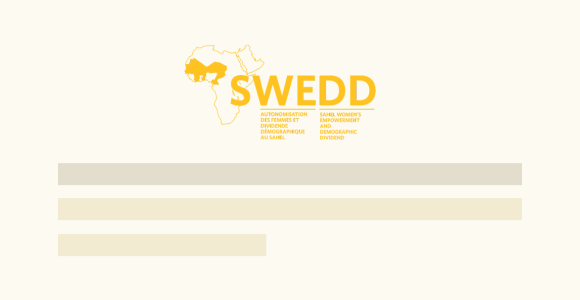

NEWS
SWEDD Regional Steering Committee meets in Ouagadougou, celebrating achievements in empowerment
18 March 2024

Ouagadougou, Burkina Faso - The 7th ministerial session of the Regional Steering Committee (RSC) of the Sahel Women's Empowerment and Demographic Dividend (SWEDD) project was held from 26 to 29 February 2024 in Ouagadougou, Burkina Faso. The gathering marked a celebration of the transformative impact achieved by SWEDD across sub-Saharan Africa.
SWEDD, a visionary initiative launched in 2015 with the support of an $850 million investment from the World Bank, has been instrumental in empowering women and unlocking the demographic dividend. One of its key achievements is that it has enabled more than 903,504 new users to adopt modern contraceptive methods, giving them greater control over their reproductive health and helping to reduce unwanted pregnancies and maternal and child health complications.
Originally comprising six countries, the SWEDD has extended its scope to 12 nations by 2024. The 7th ministerial session was attended by 13 countries, eight of which were represented at ministerial level and three by senior officials. Gabon also took part as an observer, with a total of 110 participants. The meeting provided a platform for reviewing progress, filling gaps and developing a strategy for the next stages of the project.
At the end of the Ouagadougou session, the chairmanship of the SWEDD project's regional steering committee went to the Burkina Faso Minister for Health, Robert Lucien Jean Claude KARGOUGOU. Benin is Vice-Chair.
"This presidency is about strengthening the partnership and consolidating what has been achieved, but it is also about tackling a number of challenges that young girls and women still face," said Robert Lucien Jean Claude KARGOUGOU, Burkina Faso's Minister of Health.
Looking ahead, Robert Lucien Jean Claude KARGOUGOU emphasised that it is above all a question of making a substantial investment in the education of girls and the training of women. "We are going to continue to invest massively in empowering women so that they can have productive activities. We will continue to invest massively in empowering women so that they can have productive activities", added Minister KARGOUGOU, pointing out that investment will also be made in the area of health.
The 7th ministerial session of the RSC was preceded by a meeting of national coordinators and regional organisations (the Economic Community of Central African States and the West African Health Organisation), the World Bank, UNFPA WCARO and 7 resident representatives from the SWEDD countries, to review progress and gaps and prepare decision-making documents for the RSC.


Continuing to improve the well-being of women and girls
SWEDD has become a powerful force for regional integration, prioritising the empowerment of women in public policy. Through its interventions, the project aims to improve the well-being of women and girls, with remarkable results by 2023.
Thanks to the SWEDD project, the skills of 400,760 girls have been strengthened in safe spaces, enabling them to acquire the knowledge and skills essential to their personal and professional development. In addition, the economic empowerment of 139,538 girls has been achieved, providing them with employment and entrepreneurial opportunities while strengthening their financial management skills.
In addition, SWEDD's economic support has enabled 1,050,472 girls to continue their education, improving their prospects and breaking the cycle of poverty. This investment in girls' education has yielded remarkable results, with an astounding 96% retention rate of adolescent girls enrolled in secondary schools as a result of SWEDD's interventions.
The project's commitment to inclusive development can be seen in initiatives such as the creation of 8,473 clubs for husbands and future husbands, encouraging greater male involvement in gender equality and reproductive health issues. This inclusive approach aims to reshape societal norms and promote egalitarian relationships, thereby fostering a better future for all.
SWEDD's impact extends beyond the classroom, with more than 633,441 adolescent girls benefiting from schooling-related interventions, ranging from transport to accommodation and extra tuition. This comprehensive support ensures that girls have access to the tools and resources they need for their educational journey.
